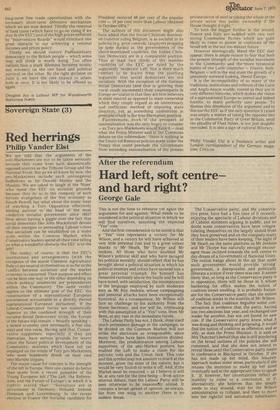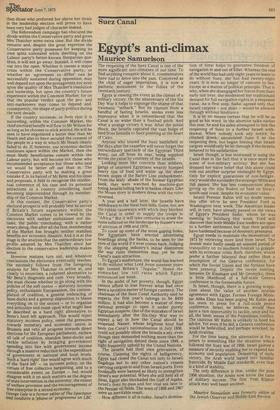After the referendum
Hard left, soft centre and hard right?
George Gale
This is not the time to rehearse yet again the • arguments for and against; What needs to be considered is the political situation in which we will find ourselves, assuming the expected "Yes" vote.
And the first consideration to be noted is that a "Yes" vote represents a victory for Mr Wilson, and a victory he will have achieved at very little personal cost and to a great extent thanks to Mr Heath, Mr Thorpe and Mr Jenkins. All those who have doubted Mr Wilson's political skill and who have savaged his political morality, should reflect that he has brought about a political situation in which his political enemies and critics have secured him a great personal triumph. He himself has remained curiously above the battle and he will have noted, with satisfaction, the intemperance of the language employed by such moderate men as Mr Roy Jenkins, whose campaigning and personal attacks have been exceptionally hysterical. As a consequence, Mr Wilson will face no challenge to his authority from the Home Secretary; and nor will he, continuing with this assumption of a "Yes" vote, from Mr Benn, at any rate in the immediate future.
The Labour Party has not, I think, done itself much permanent damage in the campaign: to be divided on the Common Market will not strike the electorate as irresponsible, since many families have been themselves divided. Moreover, the predominance among Labour supporters, of the anti-Market posture, has enabled the Left to stake a claim for the patriotic vote and the Union Jack. This vote and this symbol may not amount to much at the moment, given the state of the nation; but it would be very foolish to write it off. And, if the Market issue be removed — as I believe it will be, at any rate for the time being — from active internal debate, then the Labour Party will be seen otherwise to be reasonably united. It contains a broad spread of opinion, as always, but from one wing to another there is no sudden break.
The-Conservative party, and the conservative press, have had a fine time of it recently, enjoying the spectacle of Labour divisions and of Cabinet ministers arguing in public; and no doubt some conservatives have been congratulating themselves on the largely united front they have preserved and on the company many of their leaders have been keeping. The sight of Mr Heath on the same platform as Mr Jenkins and Mr Thorpe has naturally enough encouraged those inclined towards the soft centre to day-dream of a Government of National Unity. The notion hangs about in the air that some such government would provide 'strong' government, a disreputable and politically illiterate a notion if ever there was one. It seems likely that, so long as the Conservative party is in opposition, there will be those in it whose hankering for office makes the notion of coalition sweet smelling. It is probably fortunate for the Conservative party that the notion of coalition stinks in the nostrils of Mr Wilson.
The fact that coalition beguiles some conservatives is evidence that the party, having lost two elections last year, and exchanged one leader for another, has not yet found its neW role. If the Conservative party knew what it was doing and thinking and proposing, it would find the notion of coalition as offensive, and as silly, as does the Prime Minister. It is said on Mrs Thatcher's behalf that she is still pondering on the broad outlines of the policies she will commend, and that she does not intend to reveal these until the Conservative party meets in conference in Blackpool in October. If she has not made up her mind, this leisurely approach makes some sense, particularly if she retains the intention to make up her mind eventually and at the appropriate time to speak it. If, however, her uncertainties reflect an inability to come to a conclusion, or alternatively, she believes that she simplY needs to stay around, wait for the Wilson administration to collapse, and then to move into her rightful and automatic inheritance,
then those who preferred her above her rivals in the leadership election will prove to have been very bad judges of character indeed.
The Referendum campaign has obscured the divide within the Conservative party and given Mrs Thatcher some extra time. But the divide remains and, despite the great expertise the Conservative party possesses for keeping its own splits concealed while dwelling on the Labour party's better-known fissiparous qualities, it will not go away. Instead, it will come out into the open. Whether it causes a major crisis within the Conservative party, or whether an 'agreement to differ' can be successfully sustained during opposition, may well depend not upon the protagonists nor even upon the quality of Mrs Thatcher's resolution and leadership, but upon the country's future experience within the Common Market: for on that the popular verdict upon the proand anti-marketeers may come to depend and, consequently, the shape of party politics during the next decade.
If the country succeeds,. or feels that it is succeeding, within the Common Market, the chief electoral benefit will flow to Mr Wilson for as long as he chooses to stick around, He will be seen to have negotiated a better deal than Mr Heath and also to have secured the consent of the people in a way in which Mr Heath clearly failed to do. If, however, our economic decline continues apace within the Market, then the most likely beneficiaries remain within the Labour party, but will become not those who recommended acceptance but those who said we would be better off out than in. The Conservative party will be making a great mistake if, in its hatred of Mr Benn and his ideas and proposals, it fails to recognise the intellectual coherence of his case and its potential attractions to a country considering itself becoming impoverished through its membership of the Common Market. In this context, the Conservative party's electoral prospects will probably best be served if Britain's future experience within the Common Market comes to be viewed by the electorate with neither enthusiasm nor distaste, the public concluding, with a rather weary shrug, that after all the fuss, membership of the Market has brought neither manifest benefits nor economic disaster. And it is at this stage in the analysis that the extraordinary low profile adopted by Mrs Thatcher since her election to the conservative leadership makes sense. .. However matters turn out, and whatever conclusions the electorate eventually reaches, the necessity follows from the foregoing analysis for Mrs Thatcher to arrive at, and clearly to enunciate, a coherent alternative to Mr Benn's diagnosis and cure. Very broadly, she must choose whether to go along with the policies of the soft centre — statutory incomes policy, enthusiastic Europeanism, the contemplation of coalition, a general embracing of lame-ducks and a general disposition to blame everything on to the unions — or to organise and articulate and insist on what might best be described as a hard right alternative to Benn's hard left approach. This would reject statutory incomes policy, resist the pressures towards monetary and economic union in Brussels and veto all progress towards direct elections for the European parliament, eschew all talk of coalition, abandon lame-ducks and tackle inflation by bringing government Spending into line with government income through a massive reduction in the expenditure of government at national and local levels. Such a 'hard right' line would agree with much of the 'hard left' — on incomes policy, on the virtues of free collective bargaining, and to a considerable extent on Europe — but would disagree with it on such matters as the degree of state intervention in the economy, the extent of welfare provision and the encouragement of free enterprise in a mixed economy.
George Gale is a former editor of The Spectator and conducts a 'phone-in' programme on LBC



































 Previous page
Previous page